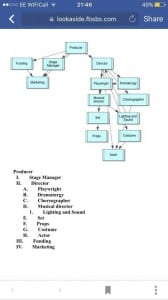In our second theatre company session, the formation of our group was finalised. As a new company, it was important for us to establish a hierarchy with set roles early in the process in order for both the creative and production process to run smoothly. It was also necessary for us to begin thinking about the kind of company we wished to form, as well as the type of performance we wished to produce.
We are quite an eclectic group of people, and having not worked with half of the group in a creative capacity before, it proved interesting to learn where each person’s interests lay in relation to what we want our company and our show to be. We learned early on that we all wanted to create a traditionally scripted play, and that we are all interested in different forms of comedy, especially that of a dark and farcical nature which led to us unanimously agreeing upon this being the basis of our show. However, as a group we were split when trying to decide on a theme within this – a few members of the group wished to create a politically charged piece of theatre, with the other half wishing to do something less political and more light-hearted. As this was an initial meeting with the whole company, we chose to think over the type of comedy we wished to create, leaving talk of politics and social themes aside for our first devising session.
We also used this session to assign roles and establish a hierarchy. This was a key milestone in the formation of our company. Although we had agreed that our show would be created by us as a collective, with each of us having input towards scenarios for the script within devising sessions, we also needed a sense of order within the company. A hierarchy would provide us with a clear set of roles, along with who each role is answerable to, as well as telling us who has final say in the event of a disagreement within the group. It was agreed that the Director would have final say regarding all creative decisions, but the Producer would have final say overall, especially regarding anything which affects budget or how we run as a company.
I am acting as stage manager within the company. This means I act as “the channel of communication between all the people and departments contributing to [the] production” (Hawkins and Menear, 2011) as well as “[having] overall responsibility for the stage management team” (Pallin, 2010). The stage management team would typically consist of Stage Manager, Deputy Stage Manager and Assistant Stage Manager, all of whom would oversee the different technical and production roles within the company. However, within our company each production and technical role has already been assigned, meaning only one Stage Manager is needed. It was also decided early on that I would have another role as a performer. Stage managing and performing are not usually roles which are paired together, so it will most likely be a challenging task juggling both roles. Having never before stage managed, it will also be exciting to experience a different side of a show from a production role, as well as pushing myself by placing myself in a position of organising a group.
Works cited:
Hawkins, T and Menear, P. (2011) Stage Management and Theatre Administration. London: Phaidon Press limited.
Pallin, G. (2010) Stage management: the essential handbook, 3rd edition. London: Nick Hern Books Limited.
Figures:
Figure 1 – Bailey, N. (2017) Screenshot of Heirarchy. Lincoln.

